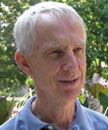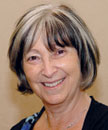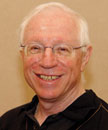Medin Returns to APS Board as President-Elect
Heartfelt thanks to outgoing Immediate Past-President Walter Mischel and Board Members Thomas Oltmanns and Sharon Thompson-Schill for their dedicated service to APS.
Douglas L. Medin
Northwestern University
President-Elect, 2010-2011

Douglas L. Medin
During his term, APS President-Elect Douglas Medin hopes to build on the Association’s mission to promote psychological science’s international scope. “One of the reasons APS changed its name [from the American Psychological Society] was to mark the goal of supporting psychology as an international discipline,” he said. “I think this is an important goal and that presently psychology may be the most parochial of all the social sciences.” Medin hopes to expand psychology’s outlook in the upcoming years by building on “prior APS efforts and taking further steps to promote increasing diversity in our field at every level.”
At Northwestern University, where he is a Professor of Cognitive Psychology and co-Director of the Cognitive Studies of the Environment program, Medin’s research focuses on categorization and reasoning, decision making, and cultural and biological thought. He investigates the role of emotions and moral values in the decision making process. Additionally, Medin studies how our ideas of the natural world develop, exploring biological thought from a cross-cultural perspective. Through a collaboration with researchers on the Menominee Reservation in Wisconsin and the American Indian Center in Chicago, Medin explores the scientific reasoning orientations of children across cultures, as well as across urban versus rural populations. This research aims to develop workable interventions to improve students’ understanding of science in the classroom.
Medin’s dedication to psychological science has been recognized with numerous honors and leadership positions. He is an APS Fellow and was elected to the American Academy of Arts and Sciences in 2002 and the National Academy of Sciences in 2005. Medin received the APA Distinguished Scientific Contribution Award in 2005 and the APA Presidential Citation in 2008. He has previously served on the Boards of APS, the Cognitive Science Society and the Psychonomic Society.
Janet Polivy
University of Toronto, Mississauga
APS Board Member 2010-201

Janet Polivy
Newly-elected Board member Janet Polivy’s commitment to the science of psychology is evident not only in her research, but in her enthusiasm for APS from the beginning. “I joined APS as soon as it was formed, and quit APA the same day,” said the APS Fellow and Charter Member. “I was excited about an organization for scientific psychologists.”
Polivy’s research is focused on eating behaviors, particularly on how restrained eating will influence behavior and self-perception. She has identified chronic dieting as a contributor to binge eating, an effect she and her colleagues call the “what the hell effect.” She has found that binge eating can occur as a response to a multitude of factors, including feelings of dysphoria, alcohol consumption, anticipated food restriction or deprivation of one’s favorite food, overeating by others, and/or the anticipated or actual breaking of one’s diet. Polivy’s research also examines, more generally, the effects of suppressing motivated behaviors. She examines the process of self-change and how unrealistic expectations for change may lead to failure, a result often found in chronic dieters. This “False Hope Syndrome” can contribute to lowered feelings of self-esteem and self-image which tend to accompany the failed effort. Polivy also studies the social and emotional influences on eating behaviors, as well as the risk factors for eating disorders.
Polivy received her MA and PhD degrees at Northwestern University and is Professor of Psychology at the University of Toronto-Mississauga. She also currently serves on APS’s James McKeen Cattell Fellow Award Committee. As one of the newest members of the Board, Polivy is looking forward to contributing to the organization that she has been a member of for so long. She is hoping to learn about the issues that face APS and “contribute to enhancing the understanding of the science of psychology.”
Morris Moscovitch
University of Toronto
APS Board Member, 2010-2013

Morris Moscovitch
APS Fellow and Charter Member Morris Moscovitch aims to understand the cognitive processes mediating memory, attention, and recognition of faces and objects. He has made significant contributions to the study of memory, with much of his research revolutionizing current understanding. Moscovitch’s component process model of memory supports modularity and functional localization within the brain and has become one of the standard models within the field. His multiple-trace theory of memory consolidation (formulated with Lynn Nadel) reshaped earlier notions about the role of the hippocampus in memory storage and retrieval, which argued that memories can be maintained independently of the hippocampus after a period of time. Rather, the multiple trace theory asserts that the hippocampal system is always necessary in maintaining episodic and spatial memories. Additionally, evidence from Moscovitch’s research in facial perception has shown there are dedicated neural mechanisms for processing facial features. Moscovitch studies both young and aging populations as well as clinical populations, using behavioral, structural and functional neuroimaging techniques.
In 2008, Moscovitch received APS’s William James Fellow Award in recognition of his significant lifetime contributions to the science of psychology. He has previously served on the APS Fellows Committee and currently serves on the William James Fellow Award Committee.
Moscovitch is Max and Gianna Glassman Chair in Neuropsychology and Aging at the University of Toronto, and Senior Scientist at the Rotman Research Institute, Baycrest Centre for Geriatric Care. Romanian-born Moscovitch was raised in Israel and Montreal, where he became interested in memory research while attending McGill University. He earned his Master’s and Doctoral degrees at the University of Pennsylvania and went on to teach at the University of Toronto, where he has been since 1971.





APS regularly opens certain online articles for discussion on our website. Effective February 2021, you must be a logged-in APS member to post comments. By posting a comment, you agree to our Community Guidelines and the display of your profile information, including your name and affiliation. Any opinions, findings, conclusions, or recommendations present in article comments are those of the writers and do not necessarily reflect the views of APS or the article’s author. For more information, please see our Community Guidelines.
Please login with your APS account to comment.